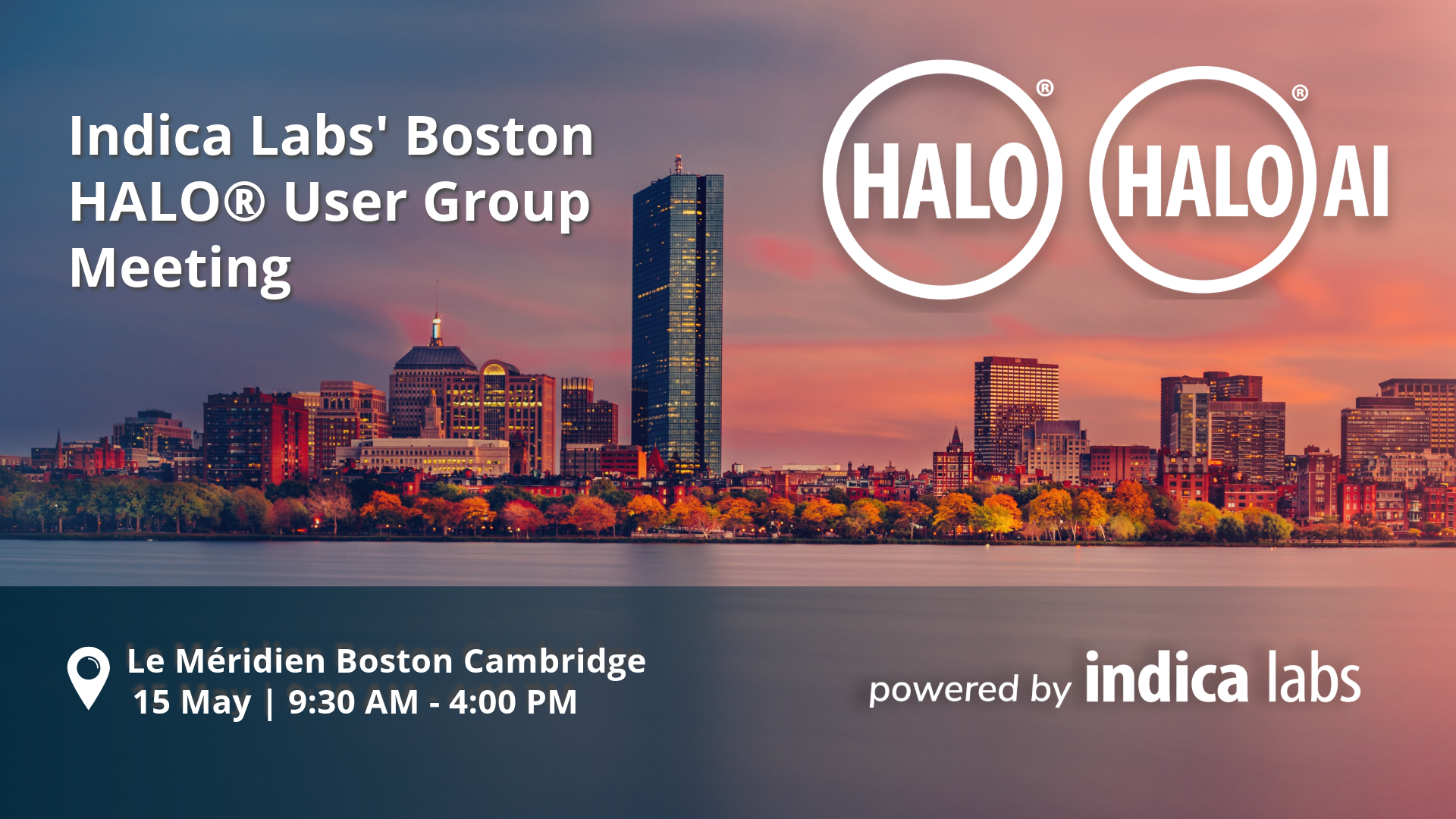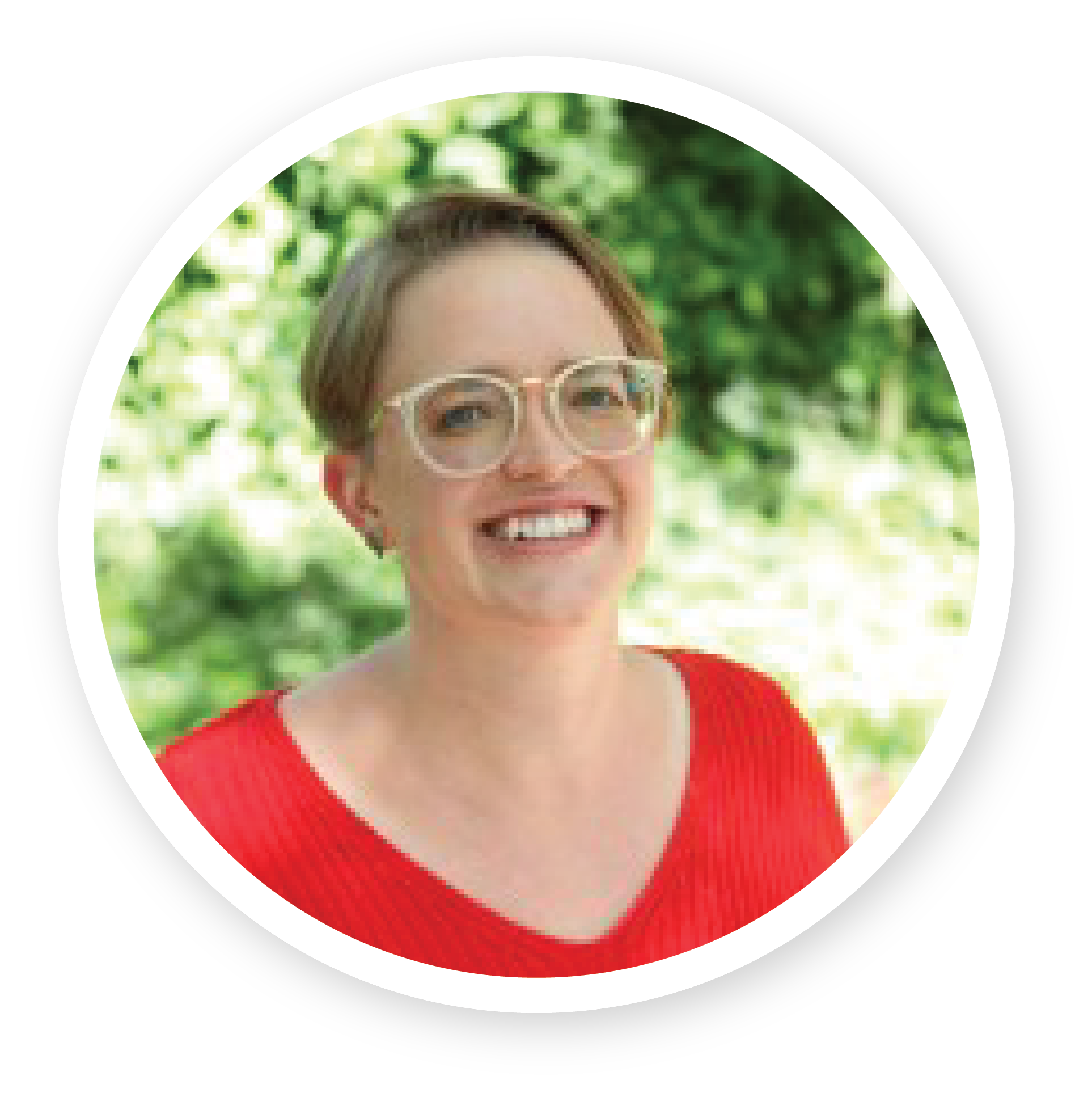
Indica Labs’ Boston HALO® User Group Meeting
Date: 15 May 2025
Time: 9:30 AM – 4:00 PM
Location: Le Méridien Boston Cambridge
Learn about the latest advancements in HALO products and services and how customers employ them to advance their digital pathology.
Summary
Indica Labs is pleased to announce our Boston HALO® User Group Meeting at Le Méridien Boston Cambridge on May 15 from 9:30 am – 4 pm. A lunch will be provided to all pre-registered attendees at 11:50 am.
Our program this year features a diverse mix of customer speakers and internal presentations covering research applications, clinical trials, and diagnostics. Our outstanding guest speakers from pharma, academia, and government will showcase their work using the HALO image analysis platform as well as projects performed in collaboration with Pharma Services. Indica Labs will present on the new features available in the latest Life Sciences 4.1 release and what’s coming in 4.2, and will showcase our AI-powered, pathologist-driven HALO AP® platform.
We welcome anyone who is interested in learning more about Indica Labs’ AI-powered digital pathology solutions to register for the meeting. You do not need to be a current Indica Labs customer to attend.
Presenters

Adam Smith

Hallie Rane

Scott M. Lawrence, MS, HT(ASCP)

Doug Bowman

Donald Allen
Agenda
Time | Topic | Presenters | |
|---|---|---|---|
8:30 – 9:30 | Check-in | ||
9:30 – 9:40 | Welcome Address | Adam Smith Chief Commercial Officer Indica Labs | |
9:40 – 10:00 | Advancing Research, Clinical Trials, and Diagnostics with HALO AP®: A Comprehensive Solution for Collaboration, Workflow Integration and AI Orchestration | Hallie Rane Associate Product Manager, Clinical Indica Labs
Abstract Digital pathology is transforming research, clinical trials, and routine diagnostics—but bridging these domains requires the right tools. With the flexibility to support custom workflows and built-in capabilities for algorithm deployment and validation, HALO AP® enables implementation of research-driven innovations in clinical labs, clinical trials, and drug development. Join us to see how our solution streamlines digital pathology workflows across research and clinical environments while ensuring security, scalability, and consistency at every step. HALO AP® is CE-IVDR marked for in-vitro diagnostic use in Europe, the UK, and Switzerland. HALO AP® is For Research Use Only in the USA and is not FDA cleared for clinical diagnostic use. In addition, HALO AP® provides built-in compliance with FDA 21 CFR Part 11, HIPAA, and GDPR. Biography Hallie Rane received a BS in biology from the University of New Mexico and has a background in molecular biology and evolution. Hallie joined Indica Labs in 2023 as the Product Specialist for HALO AP®. Prior to Indica Labs, Hallie worked in both industry and academic positions and has held a variety of technical and customer-facing roles, where she collaborated with customers, scientists, and technicians to develop a diverse array of products. Her journey encompassed ventures into biotechnology innovation, academic research labs, and even the realm of craft beer production, where she served as Head Brewer. | |
10:00 – 10:30 | Automating Macro-dissection with Insight | Scott M. Lawrence, MS, HT(ASCP) Algorithm Engineer IV, Associate Scientist Leidos Biomedical Research
Abstract Tissue macro-dissection is the process of physically scraping specific regions of tissue from a histological slide to enrich for that feature for downstream analysis. The overall process is extremely labor-intensive and requires highly skilled staff with a steady hand to collect the requisite amount of tissue scrapes needed for analysis. As we aim to scale up our capacity and expand macro-dissection efforts, we sought to automate and integrate the macro-dissection pipeline for improved throughput, consistency, and functionality. To achieve this, we teamed up with Indica Labs and Xyall to develop an end-to-end solution for automating macro-dissection. We leverage functionality in HALO AP®, which is used to assess the quality of the section, identify the target region(s) for dissection, and determine the number of tissue scrapes required. Furthermore, from the data collected, we aim to build more accurate models for predicting the number of tissue scrapes needed and assessing tissue quality for downstream assay suitability. Biography Scott has worked in the field of histotechnology for over 20 years. During this time, he has developed a broad background in all facets of histology and pathology. In recent years, Scott has specifically focused on multiplex immunofluorescence, quantitative digital pathology, and AI development in digital pathology. His expertise in traditional histopathology methods, combined with proficiency in information systems, has enabled him to design and manage digital pathology programs across three separate groups within the NCI. Currently, Scott leads the digital pathology group that supports the Division of Epidemiology and Genetics (DCEG) at the NCI. Here, we manage more than 1.5 million images across several studies and efforts. We provide image and data curation, assay development, and analytical support. In addition, Scott consults on and helps identify strategic digital pathology initiatives for the NCI, including supporting the enterprise deployment of HALO and HALO AP®. | |
10:30 - 11:00 | Coffee Break and Networking | ||
11:00 - 11:30 | New Features and Upcoming Developments in Life Sciences at Indica Labs | Director of Product, Life Sciences Indica Labs Abstract The digital pathology landscape continues to evolve and improve and the software solutions from Indica Labs are no exception. This presentation will showcase the latest advancements in the HALO, HALO AI, and HALO Link products and provide insight into future directions. A live product demo will show how the enhancements accelerate AI-powered analysis, streamline workflows, and unlock deeper discovery from complex imaging data. Get a first look at the latest product updates and learn more about focus areas of development for 2025! Biography Anne Hellebust earned a BS in Chemical Engineering from the University of New Mexico in 2009 and a PhD in Bioengineering from Rice University in 2015. Her thesis work evaluated the use of topically applied fluorescent contrast agent cocktails to improve early cancer detection using in vivo preclinical models. During her time in the research lab, she developed a skill set focused around confocal microscopy and image analysis. In 2016, Anne joined Indica Labs as an application scientist, providing sales and technical support to customers world-wide. In 2017, Anne became the Product Manager, Life Sciences, and advanced to Director of Product - Life Sciences in 2020. | |
11:30 –11:50 | Optimizing Digital Pathology Infrastructure Through Cloud Services | Director of Cloud Services Indica Labs
Abstract This presentation will delve into how the Indica Labs Cloud Services team can elevate your HALO infrastructure through customized cloud solutions. We will introduce the offering and present a case study from our customers at the University of Washington who achieved a 40% cost reduction in their HALO deployment cost on AWS in four months by switching to Cloud Services. We will also introduce our ability to perform custom integrations and data migrations, helping you get the most out of your data whether it comes from HALO software, a LIS|LIMS, or a third-party platform. Biography Billy is responsible for Indica Labs Cloud Services, specializing in deployment and management of cloud environments optimized for digital pathology. Billy holds both AWS Certified Solutions Architect and HashiCorp Terraform certifications and has over 10 years of industry experience within IT. Billy joined Indica Labs as a Technical Solutions Engineer in 2018, was promoted to Technical Solutions Manager, EMEA in 2021, and moved into Technical Product Management in 2022 before his most recent promotion to Director of Cloud Services. | |
11:50 - 1:00 | Lunch | ||
1:00 –1:30 | Advances in Highplex Workflows | Field Applications Scientist, USCAN EAST Indica Labs Abstract Join us for a deep dive into a multiplex fluorescence workflow showcasing all of the latest features in the HALO Highplex FL module. See the new AI-powered Threshold Assist feature and the streamlined phenotype configuration in action in a live demo, as well as the updated View Settings modal. We’ll explore updates to the AI Annotation tool and introduce opportunities to incorporate AI-based classifiers into your workflows with the classifier pipeline functionality. Biography Spencer Revill has a background in biotechnology (BTech). He ran a core facility at McMaster University for four years, making tissue microarrays, performing batch slide scanning, and running HALO analyses for academic laboratories. During that time, he acquired his master’s degree in medical sciences (MSc) focusing on lung fibrosis with the Firestone Institute for Respiratory Health at St. Joseph’s Healthcare Hamilton. As a Field Application Scientist at Indica Labs, Spencer provides pre- and post-sales support to new and experienced HALO users in pharmaceutical, academic, and healthcare organizations. | |
1:30 - 2:00 | Pharma Services: GCP, ADC, and scalable AI training | Doug Bowman VP, Pharma Services Indica Labs Abstract Our Pharma Services team is an experienced multidisciplinary team that develops AI-powered image analysis workflows to support your preclinical and clinical studies. Developing a strategy that involves a combination of in-house resources and outsourcing allows customers to focus on the key scientific questions to drive their biomarker studies forward. This presentation will provide a brief introduction of the group, introduce new capabilities, and highlight two AI workflows: analysis of ADC target expression and bystander effect, and workflows for scaling AI training using ground-truth annotations from same section mIF or IHC panels. Biography Doug is responsible for Indica Labs’ Pharma Services group which provides quantitative histopathology image analysis services to support customer’s preclinical and clinical biomarker assays. He also develops strategic business relationships to support the services business. Prior to Indica Labs, he spent 12+ years at Takeda Pharmaceuticals where he developed and expanded the tissue-based imaging capabilities to support early discovery, translational, and clinical programs. He was a key member of a team responsible for building a digital pathology laboratory that integrated LIMs, immunohistochemistry, slide scanners, and quantitative image analysis in an automated workflow. Doug has a BSE in biomedical and electrical engineering from Duke University. | |
2:00 – 2:30 | Introducing the High Dimensional Analysis Module in HALO | Donald Allen Product Manager, HALO AI Indica Labs Abstract Highly multiplex imaging is transforming the field of immuno-oncology research. As the complexity and volume of multiplexed image data continue to grow, advanced analysis tools are needed for extracting valuable insights. This presentation will explore the new capabilities introduced with the High Dimensional Analysis module, and will include unsupervised clustering and Uniform Manifold Approximation and Projection (UMAPs) for dimensionality reduction and visualization to the HALO platform. By attending this presentation, participants will gain a comprehensive understanding of how the new High Dimensional Analysis module streamlines data processing, enhances biomarker quantification, and facilitates high-dimensional analysis. Biography Donald Allen earned his BS in Microbiology, Immunology, and Molecular Genetics from UCLA. He has over 5 years of experience in R&D with Dako/Agilent in the field of companion diagnostics. He is experienced in feasibility of Class III medical device development, deployment of clinical trial assays to CROs, and the development of manual scoring algorithms. Donald now works in the field of digital pathology and image analysis to combine his work experience and his passion for computers and technology. He joined Indica Labs as an Applications Scientist in 2017, was promoted to a Sr. Applications Scientist in 2020, and most recently was promoted to the role of HALO AI Product Manager. | |
2:30 – 3:00 | Coffee Break and Networking | ||
3:00 - 3:30 | Workflow Development for AI-guided Image Analysis of Pancreatic Islets in Health and Disease | Associate Professor, Departments of Psychiatry and Cell Biology University of Pittsburgh Abstract The anatomic distribution, organization, and cellular composition of human pancreatic islets are more heterogeneous than previously appreciated. Moreover, islet responses to insults including type 1 diabetes (T1D) are not uniform. Patterns of T1D-induced cell loss vary between individuals and some islet cell populations are more vulnerable than others. This raises important questions concerning human islet organization and composition including how factors such as pancreatic anatomy, sex, and age may inform islet heterogeneity in health and T1D. Until recently, a major constraint in islet analyses was reliance on manual inspection of pancreatic tissue, which is time-consuming and labor-intensive. Rapid advances in artificial intelligence (AI)-guided approaches have dramatically accelerated the speed and throughput of whole-slide pancreatic image analysis. Here, we have established an AI-guided image analysis pipeline using HALO software for high-throughput, unbiased analyses of human islet distribution and cell composition under healthy and disease states. In parallel, we generated a computational workflow for processing these data. Our analyses offer a comprehensive characterization of heterogeneity in islet distribution and composition and the impact of T1D on these processes. Biography Zachary Freyberg, MD, PhD is a tenured Associate Professor of Psychiatry and Cell Biology in the Departments of Psychiatry and Cell Biology at the University of Pittsburgh. He received his undergraduate B.S. degree at Yale University in Molecular Biophysics & Biochemistry, graduating magna cum laude. He subsequently received both MD and PhD degrees at the Albert Einstein College of Medicine. He then continued his clinical training in an adult psychiatry residency at New York Presbyterian Hospital - Weill Cornell Medical Center. Following residency, Dr. Freyberg completed a Schizophrenia Research fellowship in the laboratory of Dr. Jonathan Javitch, examining mechanisms of presynaptic dopaminergic neurotransmission and amphetamine action using a Drosophila fly model. Dr. Freyberg subsequently started his lab at Columbia before arriving at the University of Pittsburgh in 2016. At Pitt, Dr. Freyberg has established comparative approaches in Drosophila, mouse, and postmortem human models coupled with innovative imaging approaches to study dopamine signaling in the central nervous system and in the periphery. In the brain, this work presently extends to studies of dopaminergic neurotransmission under healthy and disease states including Parkinson’s disease. In the periphery, Dr. Freyberg’s laboratory investigates dopamine’s roles as a modulator of pancreatic islet hormone secretion. | |
3:30 - 3:55 | HALO AI Apps: Training, Validation, and Deployment | Sr. Imaging Scientist Indica Labs Abstract HALO AI Apps include a variety of tissue classifiers and cell phenotypers. These pre-trained models can accelerate your life science research projects out-of-the-box or with further tuning. In this session, Bill will highlight examples from both kinds of AI Apps. He will also discuss how each were trained on tissue images and validated, as tissue classifiers and phenotypers require different strategies for high-quality training. Join this session to understand the steps taken to build, further train, and deploy these AI Apps. Like other classifiers, these AI Apps can be used in HALO modules. Bill will also provide a live demonstration of AI App deployment and analysis chaining within HALO analysis. Biography Bill Edelman earned his BS in Biology from the University of New Mexico in 2010 and a PhD in Genome Sciences from the University of Washington in 2016. His thesis work focused on mass spectrometry-based proteomics to detect kinase substrates related to Parkinson’s disease. His post-doctoral training in the Division of Medical Genetics at the University of Washington focused on understanding neurodegeneration using patient-derived induced pluripotent stem cell models, bioinformatics techniques, multi-omics approaches, and fluorescence microscopy. Bill joined Indica Labs in 2020 as an image analyst, providing HALO image analysis solutions to various pharma customers around the world. In 2024, Bill became a Sr. Imaging Scientist to lead AI Apps projects and Pharma Services for a growing number of customers with expanding clinical and research needs. He enjoys delivering custom data analysis using R and Python. | |
3:55 - 4:00 | Closing Remarks | Adam Smith Chief Commercial Officer Indica Labs |




